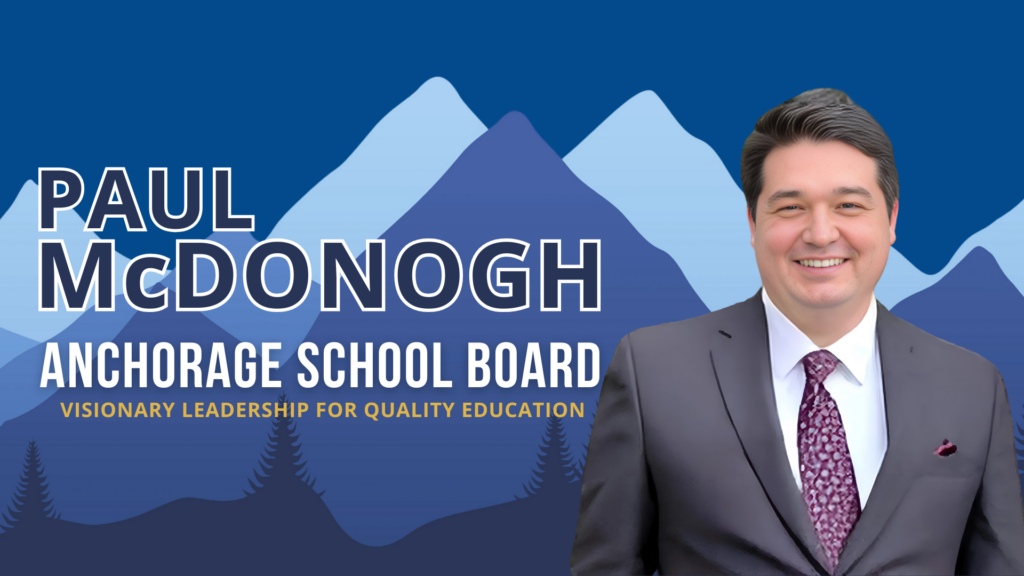
Meet Paul McDonogh
I’m Paul Paasaa McDonogh, a Sugpiaq educator and advocate for strong public schools. With ancestral roots in the Bristol Bay region, my family has lived along the Gulf of Alaska for generations. I’m proud to carry that legacy forward here in Anchorage, where I graduated from Eagle River High and now live with my wife, an Anchorage School District special education teacher, as we raise our four children, two of whom attend ASD schools.
One of my earliest memories after moving to Anchorage was walking into Miss Mayberry’s classroom at Bowman Elementary. Her room felt enormous compared to my old school, and everything about city life was fast and unfamiliar. But she made me feel like I belonged. She encouraged me to join the spelling bee, Battle of the Books, and even broomball after school. It was in her classroom that I first realized the importance of making students feel safe and included, so that they can thrive.
I earned my bachelor’s degree in chemistry from Western Governors University in 2013, along with a DEED endorsement in both chemistry and mathematics. In 2017, I completed my Master of Science in Curriculum and Instructional Design at WGU, where I focused on creating inclusive, student-centered learning environments that reflect the values and needs of diverse communities.
After college, I returned to Anchorage schools as a tutor, teacher, coach, and mentor. I taught AP Physics at Chugiak High and helped launch the school’s first Indigenous Student Club during the pandemic. One student in that group told me something I’ll never forget: “I always felt like every science teacher thought I was dumb until this year.” That reminder drives me to fight for schools where every student’s brilliance is recognized.
My journey in education has also revealed issues I know we must address. In 2021, I was devastated to learn that an Anchorage principal had confiscated a sealskin graduation cap from a Native student. I remember thinking that this was felt as a moment of grief for all Tribal communities in Alaska. It made many of us wonder for the thousandth time whether public education truly values Indigenous identities and communities. After a moment, I set aside that grief and reminded myself: this is precisely why we keep fighting.
I currently work at Chugachmiut, a Tribal nonprofit serving seven Alaska Native villages across the Chugach region. At Chugachmiut, I focus on reclaiming Indigenous education sovereignty, building Tribal capacity for school programming, and revitalizing the Sugt’stun and Eyak languages. One of the proudest milestones of my work came in 2024, when our team was awarded a U.S. Department of Education grant to pilot a culturally grounded curriculum centered on identity, belonging, and placehood. We designed the program in partnership with the Kenai Peninsula Borough School District to support more than 10 educators and help embed community values into remote Alaska classrooms.
I believe that our schools must be governed by the people they serve. That means building a school district that is more democratic, inclusive, and responsive to those most affected by its decisions. Parents and students shouldn’t be an afterthought; they should be at the forefront of shaping programs, policies, and priorities. When we trust our communities and listen deeply to those with lived experience in our classrooms, we build schools that truly belong to all of us.
To effect true change in our schools, we must begin in the classroom. Teachers are at the heart of student success and deserve to be supported by a full circle of care. When educators have what they need, families and communities thrive alongside them. I stand in solidarity with the dedicated workers who lead our classrooms. As a former member of the Anchorage Education Association and the Anchorage Council of Education, I know firsthand that empowering educators is key to building the schools our students deserve.
I’m running for the Anchorage School Board because I want every student and family to experience a sense of belonging. I want classrooms that reflect our diverse cultures, programs that empower teachers, and a system where parents play a role in shaping decisions about their child’s education. If we genuinely believe in education for all, we must build a district that listens to all. That’s the work I’m ready to do.